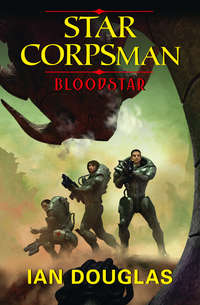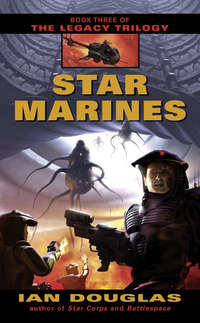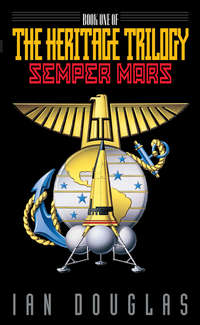
Полная версия
Singularity
During the Defense of Earth, in October of 2404, a twelve-kilo mass traveling at a significant fraction of c had skimmed past the sun and slammed into the Atlantic Ocean, 3,500 kilometers off the North American seaboard. The resultant tidal waves had scoured the coastlines of North and South America, Africa, and of Europe, killing an estimated 60 million people.
“Perhaps,” Giraurd said. “We might not be so lucky with another direct attack on Earth. That impactor might have simply been a demonstration of their power. We would not survive a determined attack.”
“I agree,” Koenig said. “And that’s why we’re out here. Even the Sh’daar don’t have unlimited resources. If we pose a threat to their worlds, to their star systems and the systems of their allies, we’ll draw them away from the Confederation.”
“You are a fly attacking an elephant, Koenig.”
“Perhaps. But elephants, I will remind you, are extinct. Earth still has lots of flies.”
“Listen to what I am saying! My point is that the Sh’daar and their allies, the Turusch, the H’rulka, the Nungiirtok, and others, are too big, too powerful, for Earth to face alone!”
“I hear what you’re saying, Grand Admiral. My point is that Earth needs time, and I’m attempting to buy that time. I’m not against negotiating. I’m just hoping we can negotiate with the Sh’daar when they’re not holding a gun to our head!”
“And if we give in to the Sh’daar demands … what is the worst that will happen? We give up our insane gallop into a world of ever higher and higher technology! We become content with what we have! We avoid the Vinge Singularity! And what would be so bad about that?”
Giraurd was referring to a long-expected exponentiation of human technology, sometimes called the Technological Singularity, when human life, blending with human technology, would pass out of all recognition. It was named for a late-twentieth-century math professor, computer scientist, and writer who’d pointed out that the rate of increase in human technology had fast been approaching a vertical line on the graph, and that had been in 1993. When the Sh’daar had delivered their ultimatum almost four centuries later, they’d demanded that Humankind stop all technological development and research, especially in the fields of genetics, robotics, information systems and computers, and nanotechnology. These so-called GRIN technologies were seen as the principal drivers in the coming Technological Singularity; arrest them, and human life might not evolve into something unrecognizably alien.
“I don’t know,” Koenig admitted. “But I do think we deserve to make our own mistakes.”
“The Sh’daar seem terrified of the Singularity,” Giraurd said. “Perhaps it is with good cause.”
“Terrified of the Singularity itself?” Koenig asked. “Or of what happens if another technic species like us reaches it?” He shrugged. “In any case, if it’s a mistake, it’s our mistake. We should not allow ourselves to be protected from it by the Sh’daar or anyone else. And more than that … don’t you think we should make our own decisions about our future and about who we’re going to play with as we move out into the galaxy? If the Sh’daar fold us into their little empire, they’ll use us like they use the Turusch and the others, right? As frontline warriors? Damn it, Admiral, the Confederation military will end up working for them, puttering around the galaxy putting down upstart technic species … species like we are now. That is, unless they decide to just turn us all into slaves and be done with it!”
“I hadn’t realized, Admiral Koenig, that you were a xenophobe.”
“I am not, Admiral Giraurd. But I do believe in self-determination for my species!”
The two men glared at each other for a moment across the table. Gradually, Koenig relaxed. He’d hoped to get the Pan-European admiral to see reason—as, no doubt, Giraurd had hoped for him—but the argument was going nowhere. Giraurd would not change his mind, and neither would Koenig.
“I see no reason to continue this discussion, Admiral,” he said. “How badly was the Jeanne d’Arc damaged?”
“Our water reserves are gone,” he said with a Gallic shrug. “Repair robots are working on the breached tanks now.”
“I’ve given order that the battlegroup’s repair and fabrication ships be deployed to lend you a hand. There were no casualties?”
“No. Your fighters were … surgically precise.”
In 1921, General William Lendrum “Billy” Mitchell had argued, then demonstrated, that aircraft, only recently emerged as military weapons, could sink battleships. Within another twenty years, air attacks against naval fleets at Taranto and Pearl Harbor would completely change the way wars were fought at sea, but in 1921 the idea was not merely revolutionary, but heretical.
Young Lieutenant Gray had demonstrated a similar principle, one now well known within the military and political hierarchies back home but frequently ignored: a twenty-two-ton fighter could disable a capital ship a kilometer long and massing millions of tons. The trick was in slipping it in exactly where it would be most effective, with enough firepower to overcome the target’s gravitic shielding. Surgical precision, as Giraurd had put it, made possible by advanced technology, was the only means by which a lone gravfighter could take down a far larger foe.
Something of the sort would be necessary if the Terran Confederation was going to win over the Sh’daar.
“The intent was to stop you, Admiral,” Koenig said. “Not hurt you.”
“I could wish, sir, that you had destroyed the Jeanne d’Arc … and me with her.”
Giraurd’s emotional pain showed for a moment, but Koenig ignored it. The man would have to explain his failure later, in front of the Senate Military Directorate. It might even mean the end of his career.
Welcome to the club, Koenig thought.
“Do you anticipate any problem getting the Jeanne d’Arc ready for Alcubierre Drive?”
“No. The damage is superficial. But we will need to take on water.”
“Of course. And this is the place for it.”
Fleet tugs were already jockeying iceteroids in so that the ships of CBG-18 could drink their fill. The Kuiper Belt of any star was the storage freezer for leftovers from that star system’s creation. Asteroids, comet nuclei, icy Kuiper objects like Pluto and Eris back in the home solar system … they drifted out here in centuries-long orbits and at temperatures a few degrees above zero absolute, with the local sun merely the brightest star in a sky filled with stars. Chunks of ice were nuzzled in close to resupply ships, which injected them with self-replicating nanodisassemblers. These, in turn, broke the ice down into fragments a few microns across, separated out the frozen methane, ammonia, and other contaminants, and transported pure water into the shield-cap tanks of the waiting ships. As quickly as one hundred-meter iceteroid had dwindled away, another was moved in to take its place; a quarter of CBG-18’s ships had already been topped off, and the rest would be refueled within four more days.
“As soon as the European contingent has been watered,” Koenig continued, “you can take them back to Sol. It’s a fifty-four-day flight under Alcubierre Drive back to Sol, so you’ll be home by early June. I’ve already spoken with the commanding officers of the other ships. The USNA flotilla will be joining me.”
“And the Chinese?”
Koenig smiled. “They’re still considering the question. Their orders were to support your operations against me … but I suspect they also have orders to keep an eye on what we’re doing out here.”
Beijing, Koenig thought, might well be interested in a separate peace with the Sh’daar, and if so, they needed to keep track of what Koenig’s expeditionary force was doing. The nine-ship Eastern Dawn Hegemon fleet might still decide to accompany the America battlegroup.
How well he could trust them when they did encounter Sh’daar forces was another matter, and one he would address when it came up. The Zheng He and her fighters would be welcome additions to the fleet, however, the next time they met the enemy.
“And where will you be going?” Giraurd asked. “If you’re willing to tell me, of course.”
Koenig considered the question. He didn’t want the politicians on Earth to be too up to date on his plans. He didn’t want CBG-18 to emerge at a target star system and find a Confederation fleet—one larger, better prepared, and more determined than Giraurd’s squadron—waiting for him there.
On the other hand, the next stop on his agenda, taken from the Turusch Directory, was a star called Texaghu Resch, located 133 light years ahead, and some 210 light years from Sol. Even if Giraurd shot the news of Koenig’s planned destination back to Sol on a Sleipnir packet, it would be eighteen days for that leg of the trip, and another 116 days for a fleet to get to Texaghu Resch, not counting the time it would take to assemble such a fleet if the Confederation Senate decided to send one. It would be more than four and a half months before Earth could reach Koenig’s next destination.
CBG-18, on the other hand, would be at Texaghu Resch in another seventy-four days. Whatever they found there, it would be another two months at least before the Confederation Military Directorate could catch up with them.
And by that time, Koenig expected that they would be long, long gone.
“Would the information, do you think, be of help to you personally when you face the Directorate?” Koenig asked.
Giraurd’s eyes widened. “Why should you care?”
“Because I know what it’s like to face losing it all, while doing what I think is my duty.”
Giraurd nodded slowly. “It would help, yes. I wouldn’t be going back … empty-handed.”
“We’re heading for Texaghu Resch. The Agletsch know of it … and it’s listed in the Turusch Directory.”
“Texaghu Resch? Strange name …”
“It’s a G-class star that’s not even visible from Earth, which is why the alien name. According to the Directory, there’s something there the Agletsch call a ‘Sh’daar Node,’ and it appears to have something to do with the Sh’daar communications and control net across the galaxy.”
“Interesting. Is it inhabited?”
“Not according to the Agletsch. Not anymore.”
The two Agletsch guides on board the star carrier America had translated the name Texaghu Resch as something like “the Eye of Resch,” Resch being the name of a mythological being in the folklore of a race called the Chelk.
Nothing was known about the Chelk now, save that, like humans, they’d once voyaged among the stars, and like humans, they’d seen pictures of their deities and heroes in the night skies of their homeworld. Exactly who or what Resch had been—god, demigod, hero, or sky monster—was unknown. Its image had been seen in the night sky of the Chelk, who’d held a modest interstellar empire in this region of the galaxy perhaps twelve thousand years earlier.
According to the Agletsch, the Chelk had refused to yield to the Sh’daar demands that they freeze all technological development.
The Chelk were now extinct.
“And after that?” Giraurd asked. “Where will you go after Texaghu Resch?”
Koenig grinned. “Even if I knew, I wouldn’t tell you. You know that. But I can tell you truthfully, Admiral, I just don’t know. It’ll depend entirely on what happens at the Sh’daar Node, and what we learn there.”
“I understand.”
“I will suggest that Earth send a follow-up, though. If we can, we’ll leave word of where we’re going next. They can keep track of us that way.”
“Yes … months too late to do any good.”
“Depends on what you mean by ‘good.’ I don’t intend to let them stop us, if that’s what you mean. But at the same time, we’re learning a lot out here about the Sh’daar, about who and what they are, about their client races, about how they see the universe. Geneva will need to know this stuff, no matter what they decide to do back there … negotiations, or a military offensive.”
Giraurd studied Koenig carefully for a moment. “You really believe that what you’re doing is for the good of Earth, don’t you?”
“Of course. I wouldn’t be out here if I didn’t.”
Giraurd shook his head. “I truly hope you know what you’re doing. I hope—”
“What?”
“I actually hope you are right, Admiral, and that the Confederation Senate and Military Directorate are wrong.”
“So do I, Admiral.”
“Because if you’re wrong, Admiral Koenig, God help us all.”
Officers Mess
TC/USNA CVS America
Kuiper Belt, HD 157950
98 light years from Earth
1215 hours, TFT
“Hey, Sandy. Mind if I join you?”
Trevor Gray looked up from his food, startled. Only a few of his friends called him that—Sandy Gray, a memento of the tactic he’d suggested at the Defense of Earth. It was a hell of a lot better than the hated nickname “Prim.”
“Schiffie! Please! Grab a seat.”
Lieutenant Rissa Schiff set her tray down and sat, smiling. “I’d grab yours if I could, Trev. But I think you’ve been avoiding me.”
“Just busy, Schiffie. You know how it is.”
He wondered if the young woman was going to be a problem.
Nine months ago, Gray and Schiff had had a little something going between them—nothing physical, quite. They’d dated, they’d flirted, and they’d talked about taking things further—she’d been a cute and enthusiastic little armful, and Gray had been trying out the idea of casual sexual relationships after a lifetime of monogie self-control. When his wife had divorced him, he’d had no one. For two years afterward, he’d had little interest in filling that aching emptiness Angela had left in him, but then he’d met Rissa, and she was cute and sweet and fun, and she’d indicated a willingness to play.
It had damned near gotten him court-martialed.
Not because he’d considered having sex with her. At the time, he’d been a lieutenant and she’d been an ensign, and officially, physical relationships between people of different ranks were discouraged. An officer handing out special favors or status in exchange for sex from a subordinate was very bad form, though it did happen, of course. But Gray and Schiff had kept their playtimes secret and, in any case, he’d been a pilot while she worked in the avionics department. He might outrank her, but he was not her boss.
But a couple of other pilots in Gray’s squadron, Howie Spaas and Jen Collins, had run into them while they’d been at a place called the Worldview, a bar-restaurant next to the spaceport at the SupraQuito space elevator. They’d started hassling him about being a Prim and a monogie in front of Rissa and he’d lost it, had decked Howie Spaas. Commander Allyn, the Dragonfires’ skipper, had come that close to sending him up for a court martial, closer still to kicking him out of the squadron.
He still liked to imagine that the extra duty, the anger-management therapy, and the ass-chewing he’d gotten from the skipper had all been worth it.
Lieutenant Spaas was dead, now—killed trying to bring his damaged Starhawk down on America’s flight deck at Eta Boötis. Collins was still in America’s sick bay, broken physically and emotionally at Alphekka. Commander Allyn was still in the sick bay as well, her brain damaged by oxygen starvation after her fighter drifted for three days through the Alphekkan debris field.
Riss had more than once indicated that she was still interested in Gray … and when her promotion to lieutenant came through on Earth four months earlier, even the technical barrier of their respective ranks had been removed. Gray had come very close to taking her to bed then … but he’d run into Angela at a big political function at the Eudaimonium in New New York and that had raised once more all of the doubts and self-searchings. Damn it, he’d thought Angela was dead after that Turusch impactor had sent a tidal wave thundering up the Hudson Valley.
Somehow, it had never happened.
And then Commander Allyn had been injured at Alphekka, the Dragonfires had suffered 75 percent casualties, Gray had been given temporary command of VFA-44 … and Schiffie had volunteered to transfer from Avionics to a replacement slot in the squadron. Now he was her boss, and he was responsible for her training.
The situation, clearly, had changed.
“I was wondering, Trev, when you were going to have some downtime. I’d still like to see you. Like we talked about, y’know?”
Gray leaned back in his chair, his lunch, half-eaten, forgotten now. Their table was near one of the compartment’s viewall bulkheads, which curved all the way around to create a 270-degree panorama of the starscape outside. The cameras transmitting the image were mounted on America’s nonrotating spine or shield cap, so that the star field didn’t move with the turning hab modules—which included the mess deck—through a full circle.
In the distance, several of the battlegroup’s members were taking on water—the United States of North America and the Abraham Lincoln, both Lincoln-class fleet carriers slightly smaller than the America. They looked like toys at this distance, gleaming in the hard white glow of the distant HD 157950. The supply ships Mare Orientalis, Salt Lake, and Lacus Solis drifted close by the carriers, each tucked in close against its own kilometer-wide floating iceberg, converting them to reaction mass and organic volatiles for the fleet’s nanufactories.
“Riss,” Gray said, “it can’t be like that. Not now. I’m your CO now.”
She laughed. “Geez, get over yourself, Trev! I’m not talking about monogie, here! Who’s going to know?”
“Me, for one,” Gray said. He’d not intended his voice to sound so cold.
Her voice turned cold as well. “Very well, Lieutenant,” she said. She stood and picked up her tray. “I apologize for bothering you.”
“Aw, sit down and eat your chow, Riss!”
But she was gone.
Monogie …
After three years, he was still having trouble fitting in.
Trevor Gray was still a Prim, raised in the cast-off wreckage of the USNA’s Periphery, specifically in the Manhattan Ruins. Squatties in the Periphery didn’t have access to the high-tech toys of full citizens, like cerebral implants and Net access, and they didn’t have the social entitlements—like medical care—of citizens either. That had been why he’d agreed to join the service: to pay for the med service when Angela had had her stroke.
Cut off from the social mainstream, Prims also had a completely different take on society. The garbage that passed for art and music, the truly bizarre fashions both in clothing and in body, the spoiled and pampered decadence of ordinary citizens, all of those were so far beyond the ken of Prims struggling just to survive within the old and flooded coastal city ruins that there seemed to be no point to social contact at all.
One major difference had been the mainstream’s attitude toward sex—casual, recreational, and often with little or no emotional commitment. In the Ruins it was different. Couples paired for life, a survival strategy in an environment where one hunter-gatherer partner watched the other’s back.
Throughout much of the human population, now, the mainstream view held that monogamous pairings—“monogies”—represented an archaic and flawed twist in human behavior. A few religious sects still required monogamous sexual relationships, while a few—the NeoMorms and fundamentalist Muslims, especially—allowed polygamy, but not the reverse, polyandry.
Damn. He’d not wanted to make Rissa angry.
Maybe when the Skipper came back and took over the squadron again. Or maybe someone else would be transferred in. Squadron CO was a commander’s billet; Gray wouldn’t even be looking at a promotion to lieutenant commander for another four years or so, and commander was a good four or five years after that, generally.
And maybe he should just forget about having a private life at all. There were always sex feeds, downloaded through your implants. Virtual sex was as good nowadays as the real thing. …
What Gray missed, he knew, was not the physical release so much as the companionship, the closeness, the belonging. When you were a part of a closely bonded pair …
Damn it all to hell. …
Standing, he took his tray to the mess deck entrance and tossed it and his half-eaten lunch into the converter. The Dragonfires were due to go on duty in another six hours, flying CAP just in case the Europeans went back on the hastily organized truce.
He wondered if the problem with Rissa was going to screw the flight scheds.
CIC
TC/USNA CVS America
Kuiper Belt, HD 157950
98 light years from Earth
1530 hours, TFT
“Message in from the Illustrious, Admiral.”
“Thank you.”
Koenig opened the channel, and Harrison’s face appeared, grinning. “Good afternoon, Admiral,” he said. “Thought you’d like to hear the news.”
“What news is that, Ron?”
“Some of us have finished up with our council of war. Looks like Admiral Giraurd is going to be going home by his lonesome.”
“Really?”
Harrison nodded. “Illustrious, Warspite, and Conqueror were with you from the get-go. You knew that.”
“I did. And thank you.”
“Don’t mention it. I’m just glad to get that weasel Coleman off my ship. She smells a lot better now that he’s gone.”
Willard Coleman had been the Confederation political officer on board the Illustrious, a civilian reporting to Hans Westerwelle on the Jeanne d’Arc, and tasked with keeping an eye on the loyalties of Confederation officers in the British squadron.
“In any case, we’ve been talking with the other commanders in the Pan-European squadron,” Harrison continued. “Except for the Jeanne d’Arc, they’re with us. Captain Michel, on the Arc, would have been too … but old Giraurd does need a way to get back home.”
“Good God. …”
“Don’t know about the Chinese, yet,” he went on. “But you can count on the rest of us. Nineteen ships, including two light carriers.”
“And that,” Koenig replied, “is the best news I’ve heard all day. Welcome aboard.”
He didn’t bring up the problems this decision would make for the various ship captains. They knew.
That they were willing to join Koenig’s career suicide, however, spoke volumes about how other naval officers viewed the Confederation …
… and what to do about the alien Sh’daar.
Chapter Five
29 June 2405
Admiral’s Office
TC/USNA CVS America
Approaching Texaghu Resch System
112 light years from Earth
1002 hours, TFT
Seventy-four days after departing the refueling rendezvous within the Kuiper Belt of HD 157950, a total of fifty-eight ships tunneled through the Void within their Alcubierre bubbles, their AIs holding them on course for a star invisible from Earth. Admiral Koenig sat in his office, reviewing again the electronic files of the ships and crews that had joined CBG-18.
In fact, only seventeen of the Pan-European Federation ships had joined the battlegroup, not the nineteen Harrison had promised. As it turned out, Captain Michel and the Jeanne d’Arc had voted to join the squadron, a surprise last-moment mutiny that had thrown the European contingent into considerable disarray. The crews of three European ships—the destroyers Karlsruhe and Audace, and the heavy cruiser De Grasse—had voted not to join CBG-18, and returned to Sol. Admiral Giraurd had left on board the De Grasse, along with the political officers and a number of other men and women who’d chosen to adhere to Confederation Navy orders. Those three ships were crowded. A number of the officers and crew of the remaining Federation ships had elected to return to Earth as well, while some on board the three had transferred to vessels remaining with the battlegroup.









